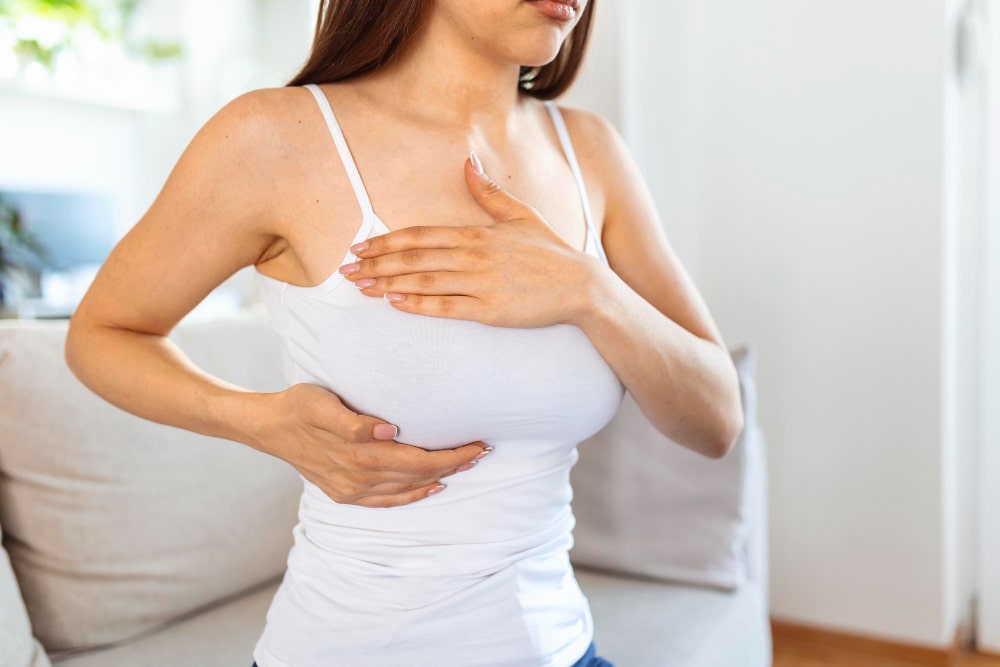Do you ever feel a sharp pain in your breast that takes your breath away? This kind of pain can come on unexpectedly, making it difficult to know what is happening or what might be causing it. In most cases, sharp breast pain does not indicate anything serious, although there are some conditions that could be at the root of this symptom. This article examines some common causes of sharp breast pain, its associated symptoms, diagnosis methods, treatment options, coping strategies, and self-care advice to reduce discomfort.
Common Causes of Sharp Breast Pain:
Hormonal Changes:
Hormone fluctuations during puberty, menopause, or periods can lead to tenderness in both breasts or just one side. This pain is usually mild and short-lasting but can be quite uncomfortable for some.
Muscular Strain:
Muscle strain or spasms in the chest wall can cause sharp pain. Activities such as carrying heavy items, pushing or pulling objects, or even sleeping on your stomach can put pressure on the muscles of the breast and lead to pain.
Breast Cysts:
A cyst is a fluid-filled sac within the breast tissue that can become inflamed or infected, leading to sharp pain sensations. Breast cysts are often benign, but they may require further medical attention depending on their size and symptoms.


Read More: What Causes Pain Above Belly Button When Pressed?
Fibrocystic Breast Changes:
Fibrocystic breast changes refer to lumpy areas of dense fibrous tissue that form in the breasts due to hormonal imbalances. The lumps can cause irritations and sharp pain.
Injury or Trauma:
Injuries such as an accidental knock to the breast can cause sudden, intense pain. It may also be accompanied by bruising and swelling.
Mastitis:
Mastitis is a bacterial infection of the breast tissue that usually occurs in breastfeeding women. Symptoms include pain, redness, tenderness, warmth, and swelling, all signs of inflammation.
Breast Infection:
An infection in the breast tissue can result in severe localized pain along with other symptoms like fever and nausea. This type of infection can occur due to an untreated injury or trauma to the area, clogged milk ducts, or mastitis that went untreated for too long.
Breast Cancer:
Breast cancer affects 1 in 8 women and is the leading cause of death among women aged 40-50. It’s important to get a mammogram if you experience sharp pain so that any underlying issues can be quickly identified and treated.
Costochondritis:
Costochondritis is an inflammation of the cartilage that connects the ribs to the sternum, which can cause chest wall pain. The condition is often caused by strenuous activity, overuse, or bacterial infection.
Angina:
Angina is a type of chest pain due to insufficient blood flow to the heart muscle, and it’s usually triggered by physical exertion or stress. It can also result in radiating pain to the arms, neck, and chest.


Read More: Throbbing Pain After Root Canal : Causes, Symptoms, Prevention
Symptoms of Sharp Breast Pain:
The symptoms of sharp breast pain will vary depending on what’s causing it but generally include localized acute or dull pains in one or both breasts. It may also be accompanied by swelling, redness, tenderness, and warmth in the affected area as well as a lumpy feeling or general tenderness in both breasts.
Diagnosing the Underlying Cause:
Diagnosing the cause of sharp breast pain is important in order to determine an effective treatment plan. Your doctor will ask about your medical history and perform a physical examination of your breasts before ordering tests such as mammograms, ultrasounds, blood tests, or biopsies to exclude the possibility of cancer.
Treatment Options for Sharp Breast Pain:
The best treatment option for sharp breast pain will depend on the underlying cause. Still, some common treatments include lifestyle changes, over-the-counter pain relief medications, warm or cold compresses, supportive bras, and prescription medications. Hormonal therapy can also prescribe for conditions such as fibrocystic breast changes and mastitis. In cases where the cause is a bacterial infection or cancer, surgery may be required.
Lifestyle changes:
- Making lifestyle changes such as getting enough rest.
- Avoiding caffeine and alcohol.
- Reducing stress levels.
- Quitting smoking.
- Incorporating exercise into your daily routine can help reduce the intensity of sharp pain.
Over-the-Counter Pain Relief: Over-the-counter analgesics such as ibuprofen or acetaminophen can help manage mild to moderate pain. It’s important to consult your doctor before taking any medication, as some drugs may not be suitable for pregnant women or those with existing health conditions.
Warm or Cold Compresses: Applying a warm compress to the affected area can help alleviate muscular strain, while cold compresses can help reduce inflammation and swelling from injury or trauma.
Supportive Bras: Wearing a supportive bra or crop top during activity can help reduce the strain on your chest muscles and minimize sharp pain.
Prescription Medications: In cases where the cause of sharp breast pain is hormonal, your doctor may prescribe hormone therapy, such as birth control pills, to reduce symptoms. Antibiotics may also prescribe for bacterial infections, while chemotherapy or radiation therapy may be necessary for treating cancer-related pain.
Read More: Sudden Sharp Stabbing Pain in Eye: Causes, Symptoms, Cure
Coping Strategies and Self-Care Advice:
Although there is no universal solution to sharp breast pain, there are some strategies that you can implement to improve your overall well-being and reduce discomfort. Here are some tips for reducing sharp breast pain:
- Practice relaxation techniques such as mindfulness and deep breathing to reduce stress
- Avoid activities that put pressure on your chest muscles
- Wear relaxing and supportive bras that fit well
- If you’re breastfeeding, make sure to keep a clean towel or cloth between you and the baby while nursing
- Get plenty of rest and exercise regularly
- Apply hot or cold compresses to the area if needed
- Follow your doctor’s treatment plan closely.
- Herbal supplements such as evening primrose oil and red clover can help reduce the symptoms of fibrocystic breast changes.
By taking care of yourself, following your doctor’s advice, making lifestyle changes, and implementing self-care strategies, you can help manage sharp pain and improve your overall quality of life.
When to Seek Medical Attention:
If you experience persistent or severe sharp breast pain, it’s important to seek medical attention as soon as possible to ensure any underlying issues are quickly identified and treated. Also, if you experience any additional symptoms such as fever, nausea, or vomiting, contact your doctor immediately.
Read More: Pain Behind Knee Hamstring: Causes, Symptoms, Treatment
Conclusion
In conclusion, sharp breast pain can cause by many conditions, and it’s important to seek medical attention if the symptoms persist or become severe. Treatment options depend on the underlying cause but may include lifestyle changes, over-the-counter medications, warm or cold compresses, supportive bras, and prescription medications. People suffering from sharp breast pain should also employ self-care strategies such as relaxation techniques, wearing supportive clothing, and avoiding activities that put pressure on their chest muscles. With proper diagnosis and treatment, most people can manage their symptoms and live a healthy life.
FAQs
A: Common symptoms of sharp breast pain include localized acute or dull pains in one or both breasts, swelling, redness, tenderness, and warmth in the affected area as well as a lumpy feeling or general tenderness in both breasts.
A: In some cases, breast cancer can cause sharp breast pain or other associated symptoms. If you experience persistent or severe sharp pain, it’s important to seek medical attention as soon as possible to ensure any underlying issues are quickly identified and treated.
A: If you are experiencing sharp breast pain, it is important to talk to your healthcare provider as soon as possible. Your healthcare provider can help diagnose the cause of the pain and recommend a course of treatment. Depending on the cause, treatments may include over-the-counter medications, lifestyle changes, or medical treatments. It is also important to pay attention to any other symptoms you may be experiencing so that these can be discussed with your healthcare provider. If the pain is severe or persistent, it is a good idea to seek medical attention right away.
There are a few risk factors that can increase your risk of experiencing sharp breast pain. These include smoking, being overweight or obese, and having a history of certain medical conditions such as thyroid disease or diabetes. Additionally, women who have gone through menopause may also be more likely to experience this type of breast pain due to hormonal changes associated with aging. Hormone replacement therapy can also increase the risk of sharp pain in some cases.

